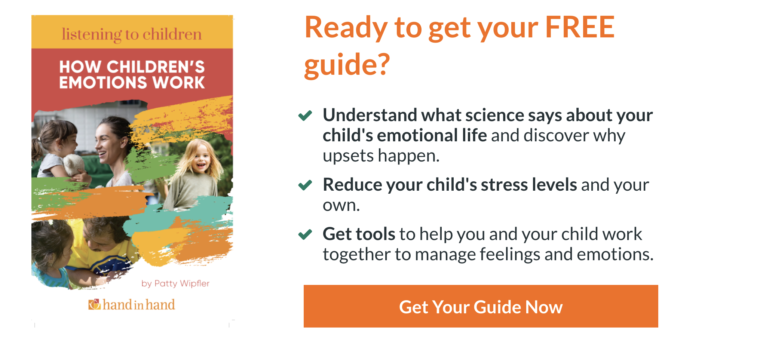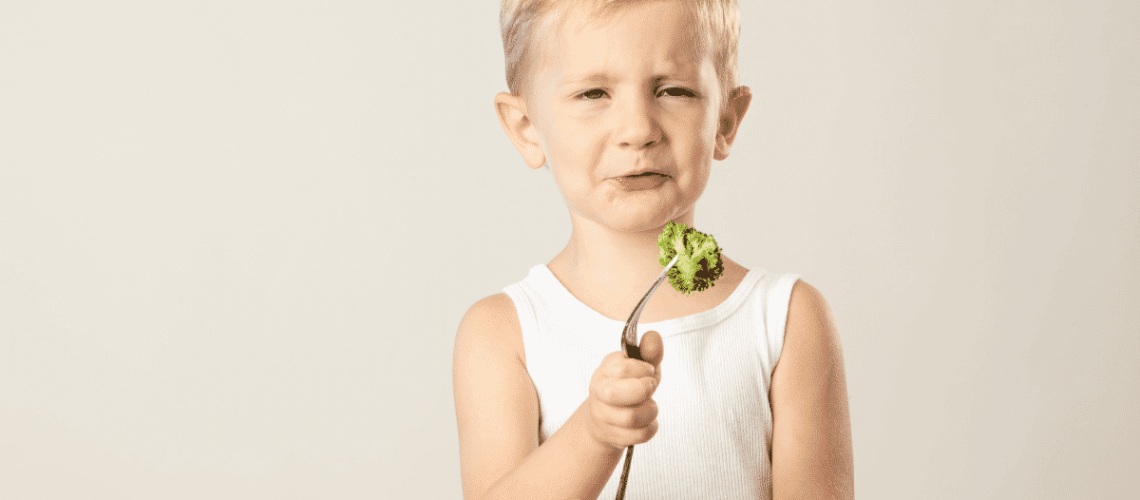When you have a picky eater, the problem isn't so much with food, it's with your child's feelings about food.
This is news to many parents. It is not commonly mentioned in mainstream parenting advice. But, read on. See if the descriptions and situations we talk about here resonate. Do they describe your child?
Children whose palate is broad generally have the feeling that food is interesting. They experience enjoyment and ease when they eat.
At one year old, one of my grandsons, would toddle downstairs to breakfast saying “Mmmmmmm!” as he thought about breakfast. Anything would do—avocados, fruit, eggs, spaghetti from the night before would be just fine with him.
A picky eater doesn't have that ease.
Food ignites strong feelings for them. When a food tastes creamy, when two foods touch each other on their plate, or when they see the color green at mealtime, feelings flare.
And there's often a matching set of strong feelings, feelings of comfort, attached to the select foods they can tolerate.
In other words, rather than being an interesting everyday experience, each food is emotionally charged, with positive and negative poles that are set off by colors, textures, smells, and how it sits on the plate.
Conventional parent tactics don't ease the child's feelings about food.
Parents try insisting that certain foods are eaten, and they try slipping healthy foods unnoticed into the child's meal. Some parents hide peas inside individual macaroni noodles, trying to make a nutritious meal!
They try pestering, and they try waiting until a child is busy, hoping the child won't notice what is being slipped into his mouth.
All These Tactics May Bring Short-term Successes, But None of Them Ease a Child's Attitude About Food.
And over time, they perpetuate tension for the child and for the parent. It is important for parents to pay attention to nutrition, so some of the above strategies may be necessary at times. But helping the child relax vigilance around food gets more fully to the emotional center of the matter.
A Respectful Way to Help Picky Eaters
I want to introduce a strategy that is respectful of a child's emotional experience, and that helps build a stronger parent-child bond in the process. To take this tack, parents need to think about their child's experience as a whole, and look for the possible roots to the feelings a child has pinned so strongly onto food.
Feelings about food may have very early roots.
When a child has strong negative feelings about an everyday occurrence like eating, it can be that those feelings spring from an early, highly charged experience that they haven't yet recovered from. For instance, I have found that babies who scream in full protest when a shirt is pulled over their heads are often babies whose births were long and difficult. Children who spent time in intensive care may, after a few months of getting used to life at home, launch screaming protests when they are laid on their backs for a diaper change.
These simple everyday occurrences carry a faint similarity to some part of the child's frightening early experience, and trigger a wildly emotional response.
The feelings don't match the innocuous nature of getting dressed or having a diaper change. They are, however, entirely appropriate for the earlier time and situation that's been triggered in the child's emotional memory.
Help Your Child Release His Stored Upsets By Listening
So when a parent works hard to shush the nighttime crying of a baby, or offers a pacifier for a baby who begins a hearty cry every afternoon at five, the parent may be making life more peaceful that day. But the child's feelings don't go away when the crying is stopped. The sadness, fear or frustration that the baby felt stays parked inside the child. Feelings build. And the child's emotional system becomes studded with delicate triggers that tip those feelings into play again.
The feelings embedded in a child's early experience can and do migrate from his baby efforts to cry.
When they reach toddler stage, your child doesn't just open up and cry, they finds things to fuss about. They hate shoes, or that they need a blankie, or the fussiness attaches to food!
They need to cry about these early frightening experiences, but were trained not to.
So now, little things set them on edge. Peas. Carrots. Anything crunchy.
Anything with vitamins in it.
Food Isn't Usually The Only Trigger For A Picky Eater
Very often, children who reject many foods, or reject sitting at the table for more than two minutes are children who have easily triggered feelings about lots of other things too. They don't like to get dressed, or hate to have their hair washed, or can't sleep unless they are held, or they wake five times every night.
Perhaps they don't like the unexpected movement of physical play, or, on the other side of the spectrum, they play hard, don't want to be cuddled much, and hate to slow down.
Any trigger helps to heal the early hurts that make mealtimes and food difficult.
These kinds of triggers offer opportunities for a parent to initiate a child's emotional healing from an early set of feelings.
Listening and allowing your child to have a full and passionate cry in your lap will help your child relax over time.
Say, for instance, that you decide to help them with their feelings about hating to get dressed.
All the child needs is someone to tell him, “I know you don't want to put on your shirt. But it's time. Here it is. I'll be with you until you can put it on.”
The upset that happens is from another time and place, but your child needs you to fully understand how hard that time was for them.
They need your steady gaze.
They need you to remind them that the shirt won't harm them, and that you're keeping them safe.
Your child will cry and fight and may sweat as well, as they offload all of those fears through their upset.
And when their mind has released enough pent-up emotion, they'll relax in your arms, be glad you are there, and will put on the shirt, which now, they can tell, poses no threat.
The overall emotional charge from their early struggle will lessen each time your child cries over it.
And you'll see that your child will gradually become better at sitting at the table too, better at sampling foods, even though their crying comes out over the aversion to getting dressed, not eating.
In fact, any upset they cry about will tap into the same reservoir of hurt if you listen warmly, and allow them time.
It's not a common way to think about how to handle picky eating, and yet, we've seen, time and time again, that your warmth and open listening after you hold a limit and your child cries helps them approach food with more ease.
How to Read Your Child's Deepest Emotions
Get your guide today and know exactly why your child whines, hits, refuses and melts down and get practical ways to help.

